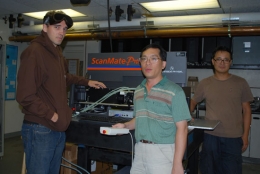Grant Will Support Research in Astrochemistry
"Very few educational institutions have such a close coupling between astronomy with telescopes and astrochemistry in the laboratory. The W. M. Keck Foundation award will allow us to tackle new problems and address important questions as they are unveiled by the large telescopes on Mauna Kea."
Professor David Jewitt,
UH Institute of Astronomy
(Honolulu, Hawaiʻi) — Understanding our origins has always been a major goal of the human intellect. With the support of a $1.2 million grant from the W.M. Keck Foundation, researchers at UH Mānoa hope to bring us closer to understanding how life may have emerged on earth.
"Some of our finest researchers are involved in this important project," said UH Mānoa Vice Chancellor for Research Gary Ostrander. "The Keck Foundation only funds cutting-edge scientific work. David Jewitt and Karen Meech of the Institute of Astronomy and the project’s principle investigator, Ralf Kaiser of the Chemistry department, are among the most knowledgeable scientists in this field of study in the entire world. We are excited about the discoveries that lie ahead as a result of this support from the Keck Foundation."
The overall goal of the project is to comprehend the chemical evolution of the Solar System through the study of Kuiper Belt Objects (KBOs) by reproducing the space environment in a specially designed experimental setup. KBOs are small planetary bodies orbiting the sun beyond the planet Neptune, which are considered as the most primitive objects in the Solar System. A study of KBOs is important because they resemble natural ‘time capsules’ at a frozen stage before life developed on Earth.
"Our methodology is based on a comparison of the molecules formed in the experiments with the current composition of KBOs," said Kaiser. "This approach provides an exceptional potential to reconstruct the composition of icy Solar System bodies at the time of their formation billions of years ago. The significance of this project is that our studies clarify the origin of biologically relevant molecules and help unravel the chemical evolution of the Solar System."
"One of the unique aspects of this project is the cross-disciplinary approach involving researchers across the traditional disciplines from the Departments of Chemistry (Ralf Kaiser, John Head), the Institute for Astronomy (David Jewitt, Karen Meech), Department of Physics & Astronomy (Klaus Sattler), and Shiv K. Sharma (Hawaiʻi Institute of Geophysics & Planetology) at Hawaiʻi and John Cooper from NASA Goddard Space Flight Center. The W.M. Keck Foundation’s support is vital to this research as it enables us to build an instrument to perform these experiments — an instrument that will be home-built right here at UH Mānoa and does not exist anywhere else in the world."
"This grant from the W.M. Keck Foundation speaks volumes about the excellence in research being conducted at UH Mānoa," said Ostrander. "Students can get great research training and conduct cutting edge graduate work right here on our campus."

# # #
Based in Los Angeles, the W. M. Keck Foundation was established in 1954 by the late W. M. Keck, founder of the Superior Oil Company. The Foundation’s grant making is focused primarily on pioneering efforts in the areas of medical research, science and engineering. The Foundation also maintains a program to support undergraduate science and humanities education and a Southern California Grant Program that provides support in the areas of health care, civic and community services, education and the arts, with a special emphasis on children and youth. Please visit www.wmkeck.org.
The School of Ocean and Earth Science and Technology (SOEST) was established by the Board of Regents of the University of Hawaiʻi in 1988. SOEST brings together in a single focused ocean, earth sciences and technology group, some of the nation’s highest quality academic departments, research institutes, federal cooperative programs, and support facilities to meet challenges in the ocean and earth sciences. Scientists at SOEST are supported by both state and federal funds as they endeavor to understand the subtle and complex interrelations of the seas, the atmosphere, and the earth. For more information, visit www.soest.hawaii.edu.
The University of Hawaiʻi Foundation, a nonprofit organization, raises private funds to support the University of Hawaiʻi System. The mission of the University of Hawaiʻi Foundation is to unite donors' passions with the University of Hawaiʻi’s aspirations by raising philanthropic support and managing private investments to benefit UH, the people of Hawaiʻi and our future generations www.uhfoundation.org.